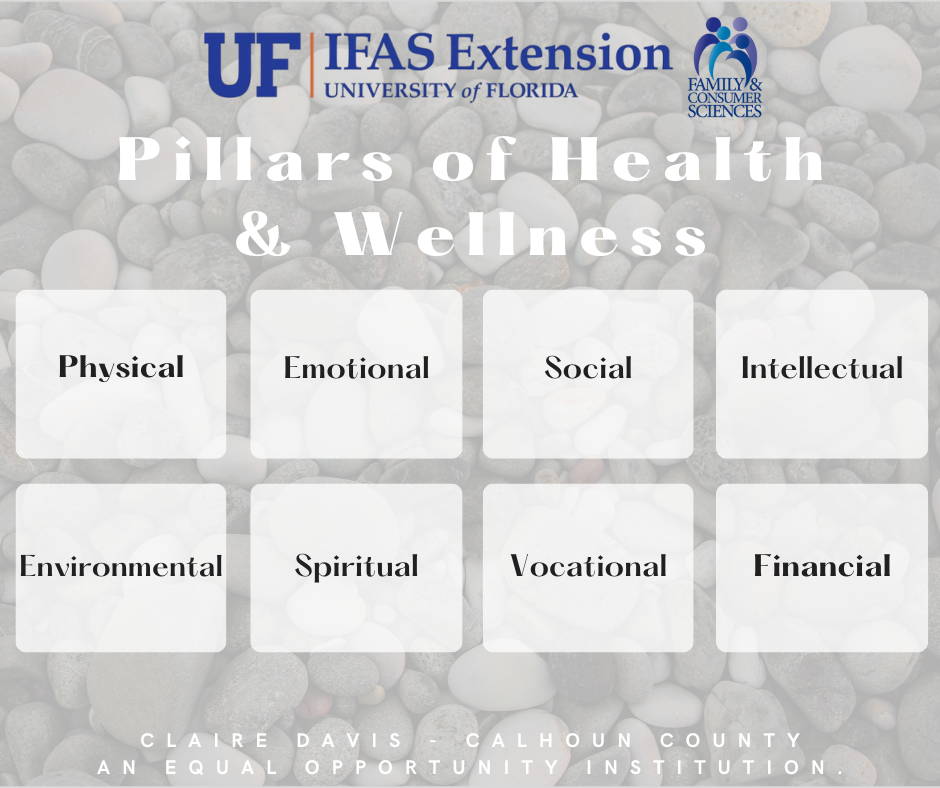
by Claire Davis | Nov 21, 2025
A few years ago, I found myself juggling too much, including: work, family, school, health, and everything in between. I was constantly exhausted, mentally foggy, and emotionally drained. I didn’t realize it at the time, but I was neglecting more than just my physical health. It wasn’t until I began exploring the idea of wellness in a broader sense that I started to feel whole again. I learned that wellness is about far more than eating right or exercising; it’s about nurturing every part of your life.
The most difficult thing for me to grasp was that wellness is not a destination, it’s an ongoing process and a lifelong journey. It’s about making intentional choices every day that contribute to your overall well-being, no matter where you are starting from. At its core, wellness is more than just physical health. It is the balance and integration of multiple interconnected dimensions that together form a strong foundation for a thriving life.
When we take a holistic approach to our health, we acknowledge that all aspects of our lives—mental, emotional, physical, social, and more—are connected. Focusing on the eight dimensions of wellness can not only improve your quality of life, but also contribute to longer life expectancy, better management of health conditions, and support in recovering from illness, injury, or addiction. It can even help prevent burnout, reduce stress, and increase life satisfaction.

The 8 Dimensions of Wellness
Each of the eight dimensions plays a vital role in your overall health and happiness, otherwise known as holistic health. When nurtured, they work together to create a more balanced and meaningful life. Here’s a look at what they are and how you can start integrating them into your life:
- Physical Wellness: Physical wellness involves taking care of your body through regular exercise, proper nutrition, adequate sleep, and preventive healthcare. Staying physically well boosts your energy, enhances your mood, and helps prevent chronic illness. To improve physical wellness, try this: Take a daily walk, drink more water, or schedule that overdue check-up. Start with one healthy habit and build from there.
- Emotional Wellness: Emotional wellness is the ability to understand, express, and manage your emotions in a healthy way. This includes recognizing stress, building resilience, and seeking support when needed. To improve emotional wellness, try this: Practice mindfulness, journal your feelings, or talk to a trusted friend or therapist when you’re feeling overwhelmed.
- Social Wellness: Social wellness is about creating and maintaining meaningful relationships and a strong support network. Connecting with others fosters a sense of belonging and can improve both mental and emotional health. To improve social wellness, try this: Reach out to a friend you haven’t spoken to in a while, join a community group, or attend a local event.
- Intellectual Wellness: Intellectual wellness encourages lifelong learning, critical thinking, and the pursuit of knowledge. Challenging your mind and staying curious can boost your confidence and creativity. To improve intellectual wellness, try this: Read a book, take an online class, learn a new hobby, or engage in thoughtful discussions.
- Environmental Wellness: Environmental wellness involves creating and sustaining a safe, healthy, and supportive space around you. This includes caring for your physical surroundings and being mindful of your impact on the planet. To improve environmental wellness, try this: Declutter your living space, spend time in nature, or reduce waste by recycling or using reusable products.
- Spiritual Wellness: Spiritual wellness is about finding purpose, meaning, and connection in life. Whether through religion, meditation, nature, or personal reflection, spiritual practices can offer clarity and inner peace. To improve spiritual wellness, try this: Start your day with a moment of gratitude, reflect in a journal, or explore practices that align with your values and beliefs.
- Vocational Wellness: Vocational wellness means pursuing work or academic paths that are fulfilling, align with your values, and make use of your strengths. It also involves finding a balance between work, school, and home life. To improve vocational wellness, try this: Reflect on your strengths and passions, set goals that align with your values, or find ways to bring more purpose into your daily tasks.
- Financial Wellness: Financial wellness involves understanding and managing your financial resources. It includes budgeting, saving, and planning for the future. Planning skills will help reduce stress and build long-term stability. To improve financial wellness, try this: Set a monthly budget, start a savings plan, or seek out resources to improve your financial literacy.

Take time to reflect on the different areas of wellness in your life.
Wellness Is for Everyone
Wellness is not reserved for a select few or those with perfect routines. It’s for everyone, no matter your age, background, or current circumstances. The beauty of wellness is that it’s highly personal, flexible, and does not have to be perfect. You don’t have to overhaul your entire life to make progress. You don’t have to address all eight areas at once. Even small, meaningful actions in one area can spark positive change in others. This can create a ripple effect across your entire holistic well-being.
Focus on progress, not perfection. Take time to reflect on what wellness means to you. Seek support when needed. And most importantly, be kind to yourself as you grow. Growth doesn’t happen overnight, but with intention and self-compassion, you can build a life of balance, vitality, and purpose.

by Melanie Southerland | Oct 1, 2025
The Power of Positive Thinking: How It Shapes Mental Health
In a world filled with daily stressors and uncertainties, the way we think can significantly influence how we feel. Positive thinking—more than just a feel-good phrase—has been shown to have profound effects on mental health, emotional resilience, and overall well-being.

Photo Source: Adobe Stock Images
What Is Positive Thinking?
Positive thinking doesn’t mean ignoring life’s challenges or pretending everything is perfect. Instead, it’s about approaching difficulties with a constructive mindset, focusing on solutions, and maintaining hope. It often begins with positive self-talk, the internal dialogue that shapes how we interpret and respond to events.
Mental Health Benefits of Positive Thinking
Research shows that cultivating a positive mindset can lead to:
- Reduced stress and anxiety: Optimists tend to view challenges as manageable, which lowers the body’s stress response.
- Lower risk of depression: Positive thinkers are less likely to ruminate on negative thoughts, a key factor in depression.
- Improved emotional resilience: A hopeful outlook helps people bounce back from setbacks more quickly.
- Better coping skills: Optimism encourages proactive problem-solving and seeking support when needed.
- Enhanced psychological well-being: Positive emotions like gratitude and joy contribute to a more balanced mental state[1][3].
The Science Behind It
Positive thinking influences the brain’s chemistry. It boosts the release of dopamine, serotonin, and endorphins—neurotransmitters that enhance mood and reduce pain. It also reduces levels of cortisol, the stress hormone linked to anxiety and inflammation. Over time, these changes can rewire the brain through neuroplasticity, making optimism a more natural response[4].
Physical Health Connection
Mental and physical health are deeply connected. Positive thinking has been linked to:
- Stronger immune function
- Lower blood pressure
- Better cardiovascular health
- Faster recovery from illness or surgery
- Longer life expectancy[1][4]
️ How to Cultivate Positive Thinking
Building a positive mindset takes practice. Here are some proven strategies:
- Practice gratitude: Keep a journal of things you’re thankful for.
- Reframe negative thoughts: Challenge pessimistic beliefs and replace them with more balanced ones.
- Surround yourself with positivity: Spend time with supportive, uplifting people.
- Set realistic goals: Achieving small wins builds confidence and optimism.
- Engage in mindfulness or meditation: These practices help you become aware of negative thought patterns and shift your focus[3].
Final Thoughts
Positive thinking isn’t about ignoring reality—it’s about choosing a mindset that supports mental strength, emotional balance, and healthier living. Whether you’re facing everyday stress or managing a mental health condition, cultivating optimism can be a powerful tool for healing and growth.
References
[1] Positive thinking: Reduce stress by eliminating negative self-talk …
[2] Positive Thinking: Benefits and How To Practice
[3] The Power of Positive Thinking and Mental Health | EmpathyHQ
[4] The Power of Positive Thinking on Health – sciencenewstoday.org

by Samantha Kennedy | Sep 26, 2025
Today’s world can offer up a lot of stressors and as a result, many individuals face mounting pressures and mental health challenges. Recent studies reveal that pet ownership provides a unique sense of comfort and stability that can alleviate stress and anxiety. By inviting a pet into one’s home, people often experience immediate emotional support and a renewed sense of purpose. The presence of a loving animal can transform a lonely day into one filled with hope and connection.
Experts in psychology and human behavior have long noted the therapeutic benefits of caring for pets. Regular interactions with animals not only reduce cortisol levels but also increase oxytocin production, a hormone associated with happiness and bonding. Dog walks, playful cat moments, and even the calm companionship of a fish tank routine give structure to daily life. These activities encourage mindfulness, improve mood, and help many cope with depression.

Holding a pet can reduce stress and increase production of “feel-good” chemicals in the brain that can improve mood. (Photo source: Adobe Stock)
One of the biggest benefits of pet ownership is that pets offer unconditional emotional support without judgment. Caring for a pet refocuses negative thought patterns by providing individuals with a sense of responsibility. Additionally, the daily routines associated with pet care foster discipline and regularity, which are essential for maintaining mental balance. Patients who engage actively with their pets frequently report feeling less isolated and more optimistic about their futures.
Community connections can also blossom through pet ownership. Local pet events and dog parks bring together individuals from varied backgrounds, creating networks of support that extend beyond the pet’s company. Such encounters not only foster social interaction but also build trust and empathy among neighbors. In many cases, these casual relationships evolve into meaningful friendships that serve as additional layers of safety and emotional reassurance. Community events centered around pets underscore the social benefits that extend from personal well-being to societal harmony.
As mental health continues to be a focal point in discussions on overall wellness, owning a pet emerges as a natural remedy for many of modern society’s stressors. While pets require time, effort, and dedication, their rewards often surpass the challenges. A pet not only enhances an individual’s health by providing physical activity through daily routines but also nurtures mental and emotional strengths. In moments of grief or stress, the steady presence of a pet can remind owners that life’s simplest pleasures are often the most profound.
For those struggling with isolation or depression, the embrace of a pet might provide a much-needed bridge to a happier, healthier future. Amid the hustle of everyday life, the soft purr of a cat, the wag of a dog’s tail, or even the quiet flutter of a bird’s wings offers solace and hope. People who have adopted pets express an enriched sense of belonging and community, experiences that are increasingly recognized as integral to mental health. Research continues to delve deeper into the intricate link between animal companionship and psychological resilience. In the meantime, pet ownership can serve as a valuable complement to traditional mental health treatments such as therapy and medication.
For more information about this and other mental health topics, please call your local Family & Consumer Sciences (FCS) agent. You can find your nearest Florida FCS agent here.
An Equal Opportunity Institution







